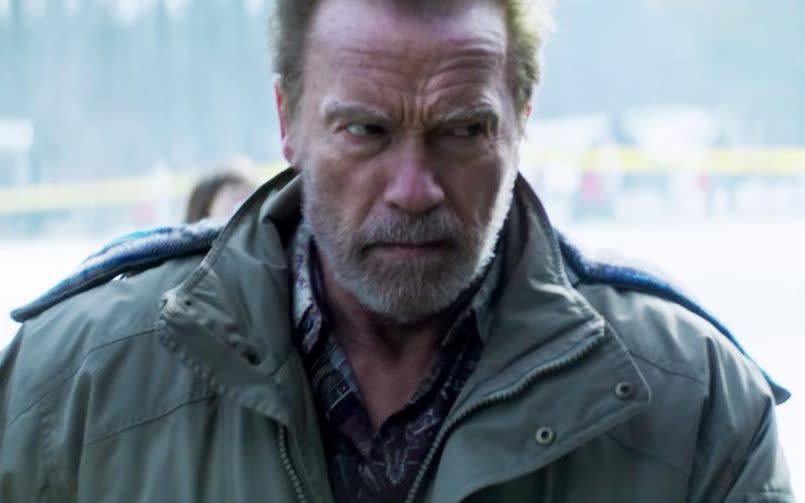Aftermath review: Arnold Schwarzenegger's dramatic comeback has a very rough landing

Dir: Elliott Lester. Cast: Arnold Schwarzenegger, Scoot McNairy, Maggie Grace. 15 cert, 90 mins
Even woeful films can distinguish themselves with grace notes. The one in Aftermath occurs when Arnold Schwarzenegger’s character, a construction foreman called Roman, is absorbing the worst news of his life. His wife and pregnant daughter have just died, in a mid-air collision between two planes, while travelling back for Christmas. All those balloons and "Welcome Home" signs put out for nothing. The humanity.
Arnie’s placidly seated in an airport interrogation room when officials relay the news. This colossal shock to the system merely renders him speechless. What we hear instead is a caged grief through the walls – the muted bellowing and pounding of another, unknown man getting the same information in an adjacent room. It’s a potent window on this hideous communal tragedy, for about a second.
There are no other good seconds. The film takes leave of credibility early, but thinks 271 people unconvincingly dying in the sky should power it through, even though little else happens you could dignify with the word story. Arnie mopes and grieves and wants the airlines, especially their atrociously acted settlement lawyers, to say they’re sorry.
Meanwhile, an air traffic controller called Jacob (Monsters’ and Argo’s Scoot McNairy) suffers personal and professional meltdown, having been the only one in a position to prevent the crash. His colleague popped out for coffee at a bad moment, see, and a crucial phone-line went dead. It would be worth knowing if any air traffic controllers got an advance look at Javier Gullón’s script, which could barely have got away with its head-desk contrivances in the era of Airport (1970).

Somehow, Jacob’s name leaks out, even though this never feels like a thing that would happen, and he finds the words “murderer”, “killer” and “murder” (must try harder) splashed with red paint over the front of his house. He changes his name, moves states, switches jobs, in a protection programme designed to rid his company of him, and him of them. His wife (Maggie Grace) can’t take the heat, so she gets out of the kitchen, and having looked at the raw scrambled eggs he’s prone to serving their son, it’s no wonder. We wouldn’t want a salmonella subplot.
No one is hailing this as a major dramatic comeback for Arnie, or at least no one who's seen it, and beheld the scene where he somehow infiltrates his way onto the wreckage site and cradles his daughter’s intact corpse. Truthfully, his haunted, lumbering performance is by no means the problem, but he feels victimised in more ways than one: if you really needed to see him brushing his teeth naked in the shower, here’s the place to roll up. At least someone had the sense not to demand soul-shaking thespian pyrotechnics from this particular source, but, really? A hair net?
McNairy, usually so good, is the one unenviably forced to do all the emoting, trapped invasively in snivelling close-ups. We know the script will eventually bring these two suicidal men face to face, as if it were something catastrophe-conjurer Guillermo Arriaga (21 Grams, Babel) had cooked up with no notice on a monster hangover.
It’s entirely possible they’ll just hug it all out. But the point of it as drama is hilariously elusive, unless British director Elliott Lester (Blitz) had more B-roll shots of diagonally-streaking contrails than he knew what to do with. (They are countless.)
Arnie, in hair net, rocking his future grandchild’s cot pre-news and even stroking its ultrasound can only strike us as A Very Bad Sign. But scoring this montage to Jingle All The Way, of all songs, feels awfully close to mockery.


